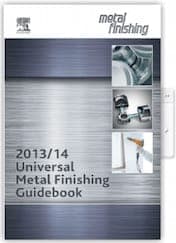
Curated with aloha by
Ted Mooney, P.E. RET

The authoritative public forum
for Metal Finishing 1989-2025

-----
Electroplating with copper and nickel for chemistry class
Q. Hi this question is based on a big presentation, and I need to know what materials are needed to successfully copper plate nickel object and nickel plate a copper object.
Faisal Ahmedstudent - Etobicoke, Ontario, Canada
2007
A. The best starting point is probably the Metal Finishing Guidebook, Faisal. But without an indication of what grade you are in and what you mean by "successful", it's a hard question to answer. If you mean good enough to show a little bit of color and thereby illustrate the principles of electroplating, it's as easy as playing "Twinkle Twinkle Little Star" with one finger on a piano. But "real" electroplating is a different matter; if you mean robust plating with a bright appearance and thick enough to be suitable for outdoor exposure, it's as hard as playing Liszt :-)
"Real" electroplating requires waterbreak-free cleaning, proprietary plating solutions, specialty grade anodes, filtration, temperature control, solution agitation, carefully engineered DC power supplies, and more. Good luck and please come back with specifics.

Ted Mooney, P.E.
Striving to live Aloha
finishing.com - Pine Beach, New Jersey
2007
Q. I'm in grade 12; it's for chemistry project and it doesn't have to be perfect but detailed very accurately to get full marks.
Faisal A. [surname deleted for privacy by Editor]- Toronto, Ontario, Canada
Hi. This just concerning the original question will you be answering it Ted or is just going to be left like that because you told me to tell you the specifics and I have but my question hasn't been answered.
Faisal A. [returning]- Toronto, Ontario, Canada
sometimes on
AbeBooks or Amazon
(affil links)

free pdf is currently available from academia.edu
Hello again, Faisal; thanks for the reminder! The previously mentioned Metal Finishing Guidebook should be available in a local library or can be obtained very inexpensively, or viewed on line. Yes, it does include the necessary operating conditions for nickel plating and copper plating. Hopefully you can do the experiment in the high school lab, without worrying about filtration and solution agitation. But I think the important part for chemistry class is not how perfect the plated surface is, but explaining the principles.
I think the really important lesson which your project should focus on is Faraday's Law. This project affords you a chance to demonstrate a very important law, and to relate some important history, while gaining a pretty deep understanding of the significance of concepts like valence, atomic weight, Avogadro's number, and gram equivalent weight. There is usually a big "Oh! Wow!" of understanding involved when you decide to demonstrate Faraday's Law and start working through the numbers. My bet is that your teacher will learn something from you and will find it hard not to give you an A+ if you focus on Faraday's Law rather than stuff like filters, and heaters, and agitation.
Best of luck.

Ted Mooney, P.E.
Striving to live Aloha
finishing.com - Pine Beach, New Jersey
Q, A, or Comment on THIS thread -or- Start a NEW Thread